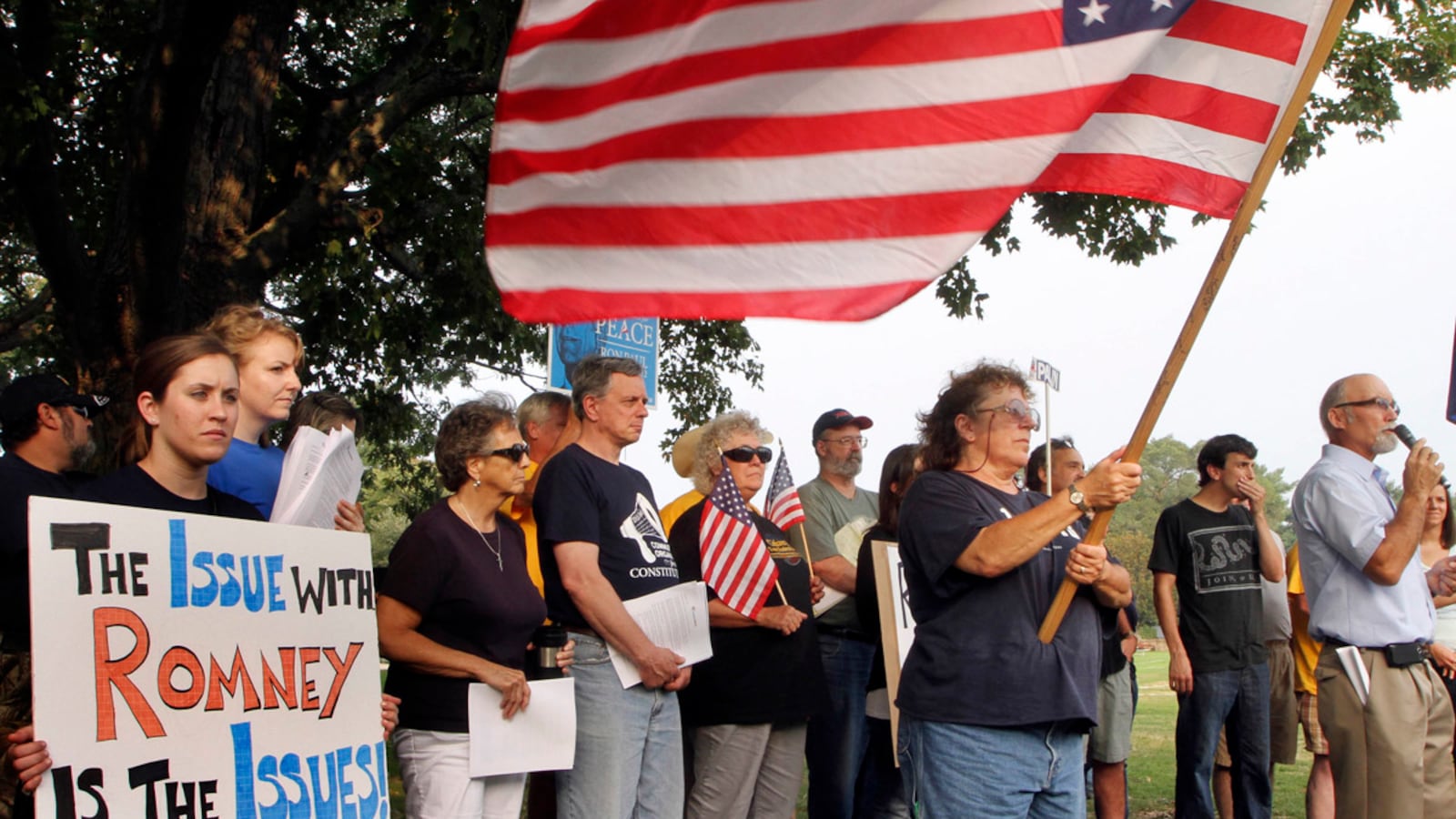It was the great wildcard going into the 2012 election cycle. Republican Party insiders openly worried the Tea Party might knock off the establishment presidential candidate, just as it knocked out establishment picks in the chaotic 2010 congressional races. Party heavyweights wondered whom the upstart movement would get behind and whether Mitt Romney could even get through the early states, given the once-raging Tea Party elements in Iowa, New Hampshire, and South Carolina.

But after months of wondering how the Tea Party would change the primary game, leaders inside the movement admit they never came in off the sidelines. For the Tea Party movement, the 2012 presidential primaries have been a bust.
“The Tea Party movement is dead. It’s gone,” says Chris Littleton, the cofounder of the Ohio Liberty Council, a statewide coalition of Tea Party groups in Ohio. “I think largely the Tea Party is irrelevant in the primaries. They aren’t passionate about any of the candidates, and if they are passionate, they’re for Ron Paul.”
Littleton is one of the many who have endorsed the Texas congressman; he blames the other GOP candidates for the lackluster energy they have generated in the grassroots that hosted a revolution two years ago.
“Not Romney” is the most popular candidate among his fellow activists, Littleton says, though no one can agree who “Not Romney” is. Without an agreement on that score, the real Romney has coasted to easy victories in New Hampshire, Florida, and Nevada, even winning a clean 50 percent of the Tea Party vote in Nevada on Saturday night while the other 50 percent split themselves among Paul, Newt Gingrich, and Rick Santorum.
Mark Meckler, founder of the Tea Party Patriots, the nation’s largest Tea Party coalition, also says the Tea Party isn’t playing a role in picking the nominee. But that is by choice, not by accident, he says.
“The real Tea Party movement is not a political party, it’s a movement,” he says. “How can a movement endorse anybody? It really can’t.”
One possible reason for the lack of consensus: Romney, Gingrich, and Santorum have each committed what most in the movement consider original sins against constitutional freedom or fiscal sanity. Gingrich and Romney both supported the TARP bank bailout in 2008, as well as individual mandates in health insurance years earlier. Santorum, the most socially conservative of the three, voted for the “Bridge to Nowhere,” among other massive earmarks, during his time in the Senate.
“No candidate is perfect,” Meckler says. “Candidates will make mistakes. I don’t want to see the movement associated with those kinds of mistakes. I support ideas, not people.”
If the Tea Party could get behind one person and call it a day, leaders in the movement say someone like Sen. Jim DeMint of South Carolina, Gov. Chris Christie of New Jersey, or Sen. Rand Paul, son of you-know-who, could capture the imagination of activists and breathe some life into their languishing presidential hopes. Even Gov. Bobby Jindal’s name comes up as someone the Tea Parties could get behind at a brokered convention, a once-fanciful idea that comes up in more and more conversations with still-pining members of the GOP base.
But Meckler and Littleton both rightly make the point that while the Tea Parties may not be dictating who the candidate is this year, they certainly have dictated the issues the candidates are talking about and what they are saying, particularly in the area of fiscal restraint, free-market capitalism, and the virtues of the Tea Party’s favorite historical document, the U.S. Constitution.
In the ultimate compliment in presidential politics, the GOP field seems to be in a daily contest to impress Tea Party voters. You’re cutting spending? I’ll cut it more. You’re stopping earmarks? I’ve never even voted for one!
At the state and local levels, Tea Parties remain highly engaged in ballot initiatives and Senate races and congressional contests. The Ohio movement won a victory in a “health-care freedom” bill in the 2011 elections. Other Tea Parties around the country say they’re focused on statewide efforts against public employee unions or health-care mandates.
But without a consensus around one candidate and no leader at the top of a unified Tea Party to call on the troops to get behind one candidate, the person the GOP is likely to nominate may be the one least able to make the Tea Party happy: Mitt Romney.
Littleton says Nominee Romney would be greeted by Tea Partiers with something between skepticism and disgust. A stronger disgust with President Obama would likely send Tea Partiers to the polls to vote for whoever the GOP nominee is, Littleton adds, but would not translate to the kind of shape-shifting energy the Tea Party delivered in 2010.
And what if Romney is elected but does not deliver on his promises, as so many Tea Partiers fear?
That’s simple to predict, says Littleton. “All hell will break loose.”






